The early years
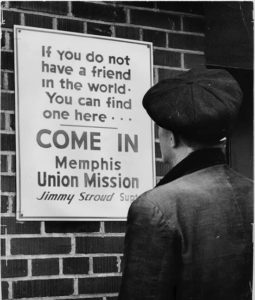
The year was 1945. As World War II drew to a close, a young man from Charleston, West Virginia, named Jimmy Stroud, was given a vision. Jimmy’s life had been radically transformed after being led to Christ at the Charleston Union Mission. Jimmy now knew that God was calling him to start a new mission in another city; he just didn’t know where.
At the same time, Christian businessman T. Walker Lewis saw that his hometown of Memphis, Tennessee desperately needed a mission of its own. After hearing about Jimmy, Mr. Lewis invited him to Memphis in April to see if he would be the man to lead the new ministry.
When the two men finally met face-to-face, they knew that God had brought them together. “My prayers are answered,” Lewis pronounced as he slapped his hand on his desk. “This is the man!” On June 17, 1945, the two men’s unified vision became a reality, and Memphis Union Mission was founded.
The Mud Island Chapel

Soon after the Mission was founded, Jimmy recognized that men recovering from alcoholism needed a retreat where they could seek long-term help.
That help was created in June 1953, when the Mud Island Chapel was founded. Isolated by the waters of the Mississippi River and reachable only by boat, the Mud Island facility housed men wanting to escape the addictive snare of alcohol as they did chores and attended daily chapel services.
But after five years, Jimmy realized that the Mission needed a more permanent facility for the recovery program. The property on Mud Island wasn’t for sale, and electric power and transportation provided constant problems. So in 1958, the Mission received 160 acres of beautiful land on Benjestown Road as a generous donation, and the Mud Island facilities were moved there. The facility – formed into the shape of a cross – was completed in August 1959 and renamed Calvary Colony. The property on Benjestown Road continues to house men who are enrolled in the Mission’s long-term recovery program.
Above the Clouds
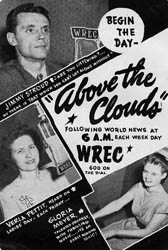
In the mid-1940s, radio was the dominant form of communication and entertainment in America. Jimmy knew that radio could be an irreplaceable tool for spreading the Gospel, as well as a way to gain publicity for the Mission. After praying about the possibility of doing a daily show, Jimmy contacted WREC and discovered that the Mission wouldn’t be charged anything for a six-day-a-week broadcast. On February 25, 1946, the Mission broadcast its very first show, called “Above the Clouds,” from WREC’s studios in the Peabody Hotel. Each show featured special music and short devotionals by guest speakers.
In the 1950s, television quickly replaced radio as the common form of communication. To keep current with the times, “Above the Clouds” began a daily television program on WREG Channel 3 in 1956. Broadcast six days a week at 6:45 a.m., the format of the show remained similar to the radio program. It remained a staple of Channel 3’s morning program until Verla Pettit’s retirement in 1989.
Serviceman’s Center
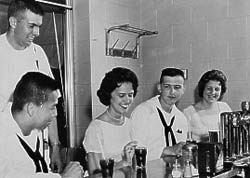
In the days preceding the Vietnam War, Jimmy Stroud developed a burden for the thousands of young men stationed at the nearby naval base in Millington. Feeling that God had provided a vast field for the harvest, Jimmy opened the Servicemen’s Center at 81 N. Second in 1966. Every weekend, a bus from the Mission would visit the naval base, pick up a load of young men and take them to the center. Snacks and recreation games were available, and Bible studies were frequently held.
At the same time, Jimmy and Verla Pettit, who eventually became the Mission’s second superintendent, began actively planning for a Christian camp adjacent to Calvary Colony. Jimmy and Verla felt that a Bible camp and conference grounds would provide a valuable service to the local Christian community, and it would also bring added funds to the Mission. So, on March 26, 1971, Victory Valley officially opened its doors for its first conference – a women’s retreat sponsored by the Victory Valley Women’s Auxiliary.
By 1970, the ministry to servicemen moved to a lakeside lodge at Victory Valley, and Verla hosted the men throughout the 1970s and ’80s. In the early 2000s, Victory Valley was closed as a camping and retreat center, and the property was absorbed into the men’s recovery program.
Recent history
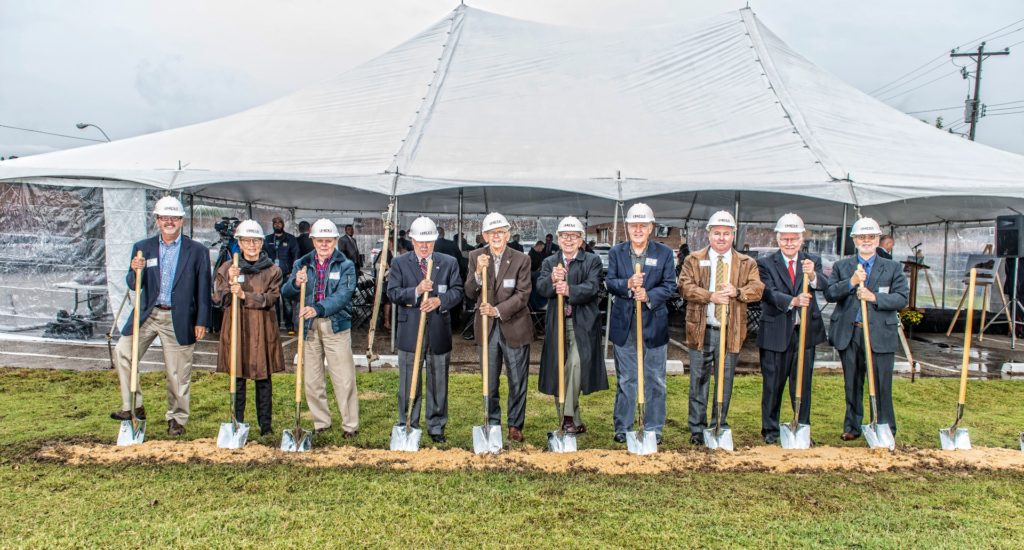
The Lord has continued to open new doors for Memphis Union Mission to minister in the community.
One such area is family ministry. Throughout the late 1990s, intact homeless families began coming to the Mission seeking help. The Mission staff began praying about providing short-term housing to such families, and those prayers were answered in the form of the Intact Homeless Family Ministry. Construction of eight homes began in 1998, and by spring of the next year, three fully furnished homes had been completed. In May 1999, the first family moved into one of the homes.
Another addition was the Wright Transitional House, which opened in August 2002. This facility can house up to 26 men who have graduated from the Mission’s long-term recovery program and who are preparing for the transition back into the community. The men reside in single-dwelling apartments on the second and third floors, adjoined by two common living areas, showers, restrooms, and public telephones. A main kitchen and dining area will also be constructed, along with a special apartment to house a live-in supervisor. The first floor houses the Mission’s administrative offices.
In 2001, the Mission also launched its annual Inner City Outreach as an effort to do a concentrated outreach to people in the inner city. Held under a large tent in downtown Memphis, the event is held every May with the help of various church sponsors. And each night of the outreach, hundreds of men, women, and children are fed and ministered to.
Another recent change was the relocation of the Mission’s Moriah House. This ministry to women and children was formerly located in Midtown. However, due to several structural issues, the Mission launched a successful capital campaign in 2005 to relocate Moriah House to a brand-new building in East Memphis. The new facility was opened in 2007.
Other recent opportunities include opening the new Opportunity Center at 600 Poplar Ave. in June 2010, which allowed the Mission to expand some of its services to the homeless in downtown Memphis.
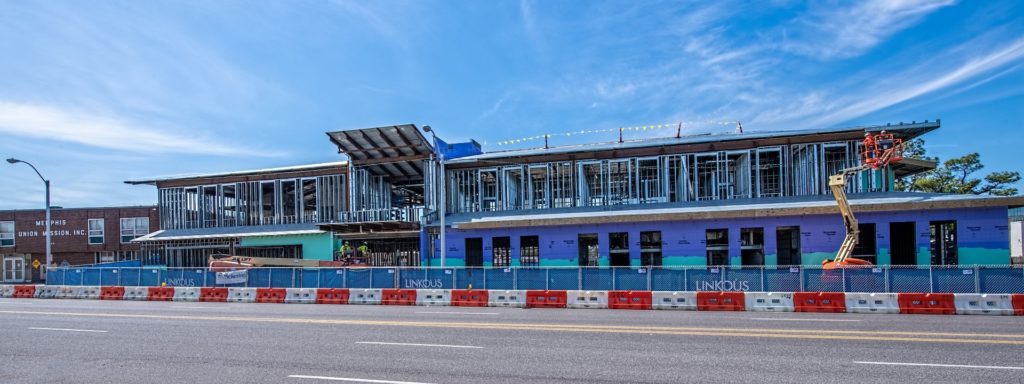
Most recently, the Mission was able to purchase property in 2012 behind its current Emergency Shelter at 383 Poplar Ave. This gives Memphis Union Mission a total of 3.1 acres at that site, where it plans to expand to minister to more needy people and provide new services.
As of 2021, Phase 1 of the New Opportunity Center is complete!
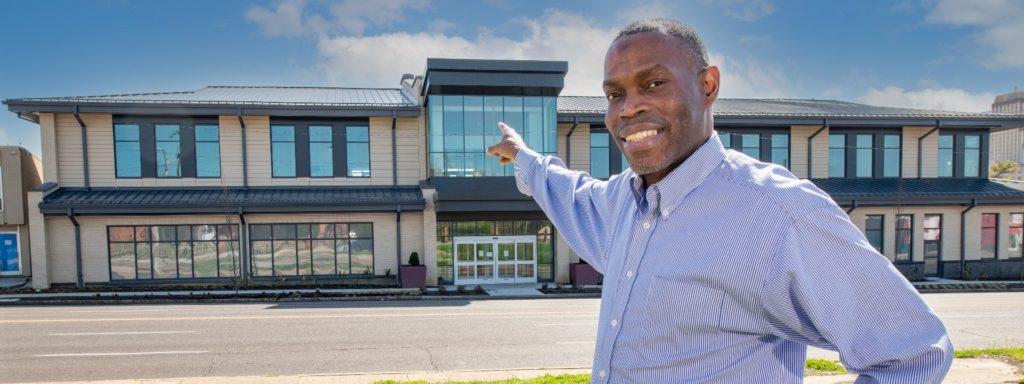
The new Opportunity Center provides dining facilities to feed 200+ at a time, 2 large dorms to house 80 additional clients, small dorms for 34 Recovery Program clients, classrooms for counseling and education and more!
Since 1945, Memphis Union Mission has gone through many changes, but its ultimate purpose – preaching and promoting the gospel of Jesus Christ – has never changed. It has brought food to the hungry, shelter to the homeless, clothes to the naked, and comfort to the weary – that all may come to know Christ.
Thank you for being a part of it all!